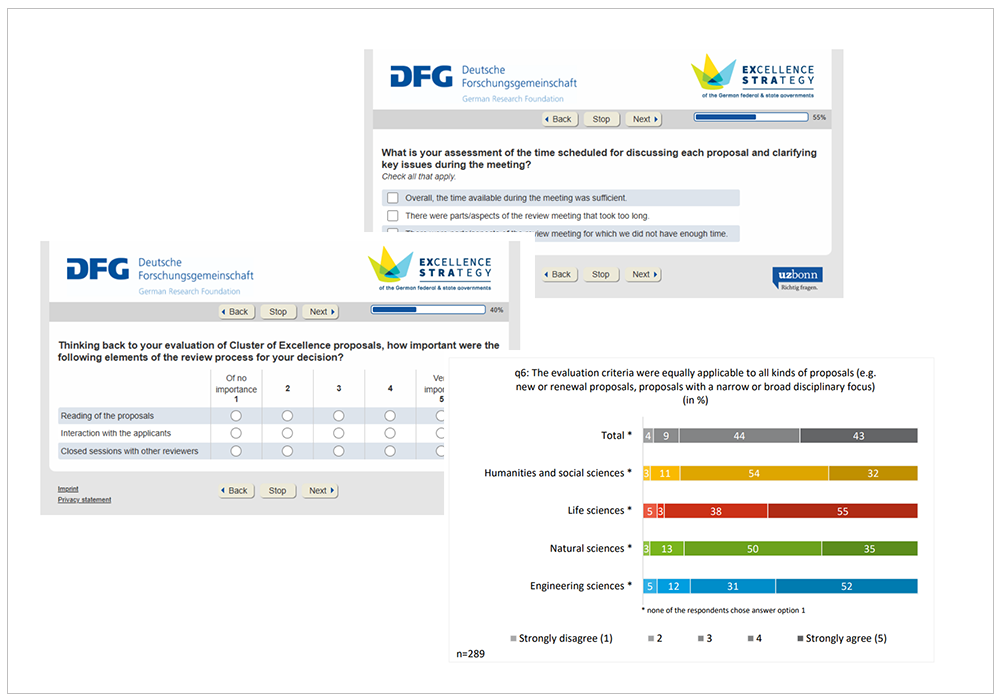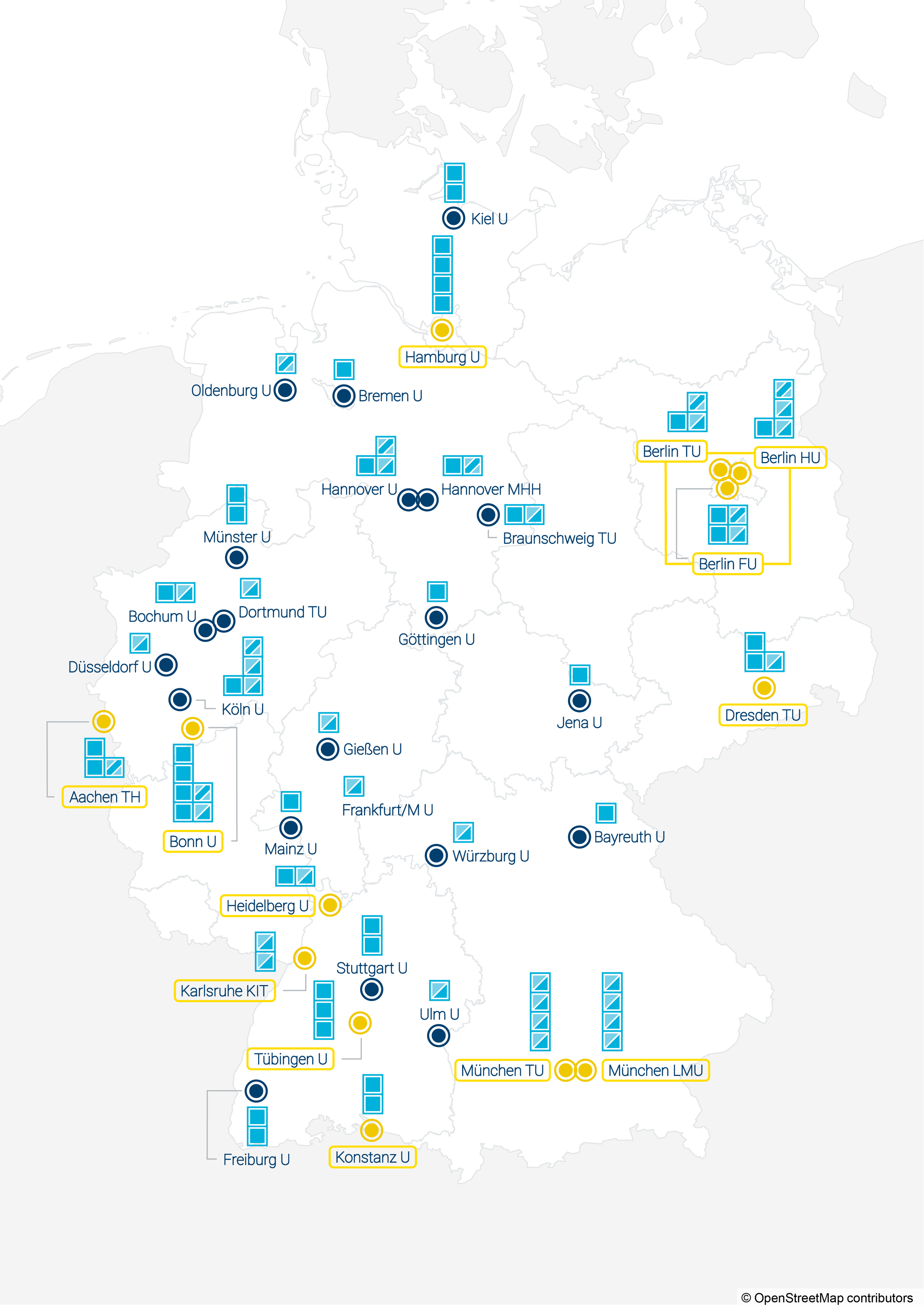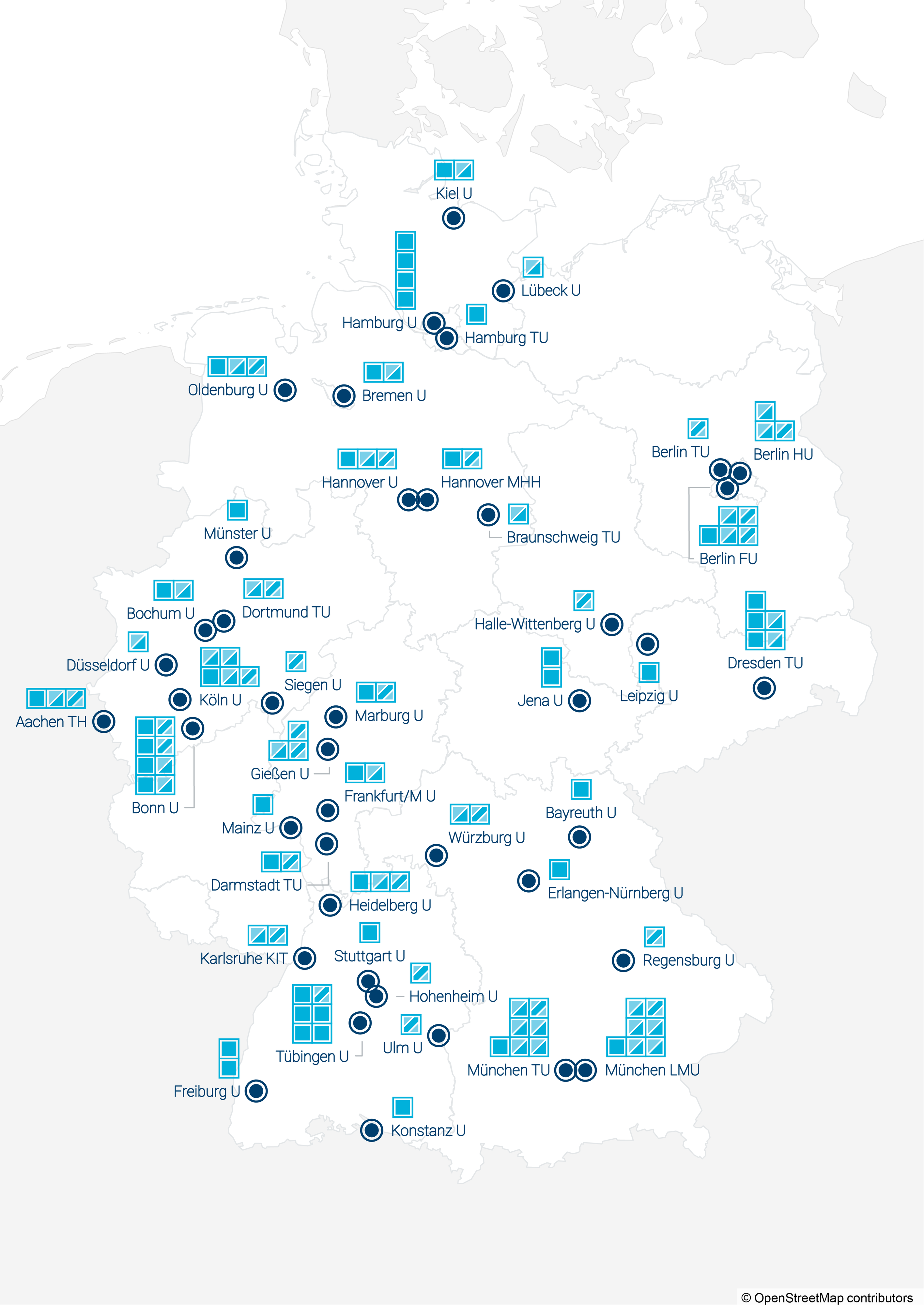Excellence Strategy
The aim of the Excellence Strategy is to strengthen Germany’s position as an outstanding research hub in the long term and further improve its international competitiveness.
It continues the development of German universities successfully begun with the Excellence Initiative by supporting research of the highest standard, enhancing research profiles, and facilitating cooperation in the research system.
Information on the Second Competition Phase
The Excellence Commission has selected 70 Clusters of Excellence in the second competition phase of the Excellence Strategy. They are based at 43 universities and will receive total funding of €539 million per year for seven years starting on 1 January 2026. See here for the main details and FAQs:
- Interactive map of funded projects (2026–2032(interner Link)
- List and map of Clusters of Excellenc(Download) (in German only)
- Press release by the DFG and the German Science and Humanities Council (Wissenschaftsrat, WR(interner Link)
- DFG publishes data story on the involvement of subject areas in Clusters of Excellenc(interner Link) (in German only)
- Results of the reviewer survey on the second competition phas(Download) (in German only)
- Our FA(interner Link) provides answers to numerous questions concerning the second competition phase. If you have any further questions regarding the Clusters of Excellence funding line, please contact: exzellenzcluster@dfg.d(externer Link).
- Information on the second competition phase is also available on the website of the German Science and Humanities Council (Wissenschaftsrat, WR(externer Link).
Funding Lines
Based on the administrative agreement reached by the federal and state governments on 16 June 2016 and updated on 4 November 2022, the DFG and the German Council of Science and Humanities are implementing the Excellence Strategy in two funding lines:
Additional Programme Information
The Committee of Experts adopted the schedul(Download) for the second competition phase of the Excellence Strategy at its meeting on 29 to 30 November 2021.
Clusters of Excellence Funding Line:
The funding decision for the next round of Clusters of Excellence was made on 22 May 2025. 70 new Clusters of Excellence will be funded from 1 January 2026 onwards.
Universities of Excellence Funding Line:
The call for proposals for the second competition phase was issued on 28 March 2024. Based on the funding decisions for the 70 Clusters of Excellence made on 22 May 2025, new proposals must be submitted by mid-November of that year. On-site visits related to these proposals will take place between April and June 2026, and on 2 October 2026 the Excellence Commission will decide on potential new admissions to the funding line. Funding will begin on 1 January 2027.
Regarding those Universities of Excellence and the University Consortium of Excellence that still meet the formal requirements for continued funding following the Cluster of Excellence decisions, evaluation will begin with the submission of self-reports on 1 August 2025. On-site visits will be conducted between late September and December 2025. In March 2026, the Committee of Experts will assess the results of the individual evaluations and present its recommendation to the Excellence Commission.
See the website of the German Science and Humanities Counci(externer Link) (Wissenschaftsrat, WR) for details.
Decisions on draft proposals and full proposals in the Excellence Strategy are made by the Committee of Experts and the Excellence Commission, respectively.
The Committee of Expert(externer Link) consists of 39 members with proven research track records who represent the entire range of academic disciplines. In addition, they have extensive experience in international settings, in university management, in teaching or in the private sector.
The Chair of the German Council of Science and Humanities and the President of the DFG are non-voting members of the committee and preside over it.
The tasks of the Committee of Experts include defining the funding criteria, evaluating the draft and full proposals on the basis of peer reviews, making funding recommendations to the Excellence Commission, deciding on the draft proposals that qualify for submission of a full proposal, and assessing the results of the evaluation of the Universities of Excellence.
The Excellence Commission consists of the Committee of Experts and the government ministers responsible for research at the federal and state levels. The Excellence Commission decides on the funding of Clusters of Excellence and Universities of Excellence on the basis of the recommendations made by the Committee of Experts..
To the Websit(externer Link) of the Joint Science Conference on the Excellence Strategy (in German only).
Second Competition Phase
The second competition phas(interner Link) for the Clusters of Excellence funding line (funding period 2026–2032) was announced in December 2022. For details of the schedule for the second competition phase under the two funding lines of the Excellence Strategy, see Schedule for the Excellence Strateg(externer Link).
Letters of intent to submit draft proposals for new Clusters of Excellence were requested by 1 February 2023. The DFG had received 143 draft proposals for new proposals by the submission deadline of 31 May 2023. These were reviewed between late August and mid-November 2023. The decision on which draft proposals would proceed to the proposal stage was made on 1 February 2024; in the case of 41 draft proposals, applicants were invited to submit proposals. None of the renewal proposals went through the draft phase.
Prior to the proposal phase, initial declarations of intent were requested for renewal proposals and updates to letters of intent for new proposals: the aim here was to integrate any interim changes into the planned review process. The deadlines here were 29 January 2024 for renewal proposals and 15 April 2024 for new proposals. 98 EXC proposals (41 new proposals and 57 renewals) were submitted by 22 August 2024. The proposals were reviewed between early November 2024 and mid-February 2025.
The funding decisions for the future Clusters of Excellence were published in a press releas(interner Link) on 22 May 2025.
Additional facts and figures on the Excellence Strategy are to be found in various DFG publications under Information Letters and Press Release(interner Link).
First Funding Phase of the Excellence Strategy
Information on the first funding period of the Excellence Strategy is provided her(interner Link).
Following the funding decisions in May 2025, there has been widespread discussion of how individual academic disciplines and subject areas are represented in the 70 funded Clusters of Excellence of the second competition phase. Using the format of a data story, the DFG has published a statistical review of the involvement of subject areas in the Clusters of Excellence in the second round of the Excellence Strategy of the federal and state Government(interner Link) (in German only). The results of this data analysis show which subject areas are involved in the 70 clusters and how their interplay shapes the interdisciplinary research profile of each cluster.
On behalf of the DFG, the company uzbonn conducted an online survey among all reviewers in the second competition phase of the Excellence Strategy. Approximately 70 percent of reviewers participated in the survey evaluating the review process. This repor(Download) (in German only) summarises the results.
On 29 and 30 April 2021, the DFG Head Office invited representatives of Clusters of Excellence from the first funding round, university representatives and members of the Committee of Experts and the Joint Science Conference (Gemeinsame Wissenschaftskonferenz – GWK) to a meeting to discuss the framework conditions for excellent research in Germany. The event provided an opportunity to discuss various perspectives on the programme, dealing with a range of aspects from proposal preparation through to the practical work of the Clusters of Excellence. The repor(interner Link) (in German only) offers further insights.
The following contact persons are available at the head office of the DFG:
For general programme information: Dr. Christine Petr(externer Link)
Contact persons for individual Clusters of Excellence and for administrative matters: Excellence Strategy and Research Impulse(interner Link)
Use of Funds for
- Nordrhein-Westfalen without Aachen and Köln: Janin Winke(externer Link)
- Brandenburg, Bremen, Mecklenburg-Vorpommern, Schleswig-Holstein, Thüringen, Hamburg: Stephan Nouer(externer Link)
- Bayern, Hessen: Berthold Hühnerbac(externer Link)
- Baden-Württemberg, Rheinland-Pfalz, Saarland: Thomas Lüdtke-Ken(externer Link)
- Berlin, Niedersachsen: Cornelia Niebu(externer Link)
- Sachsen, Sachsen-Anhalt, Aachen and Köln: Petra Hamme(externer Link)
The following contact persons are available at the head office of the German Council of Science and Humanities:
For general programme information and for the Universities of Excellence funding line: Dr. Inka Spang-Gra(externer Link)
- Information Letters and Press Release(interner Link)
- Joint answers issued by the DFG and the German Science and Humanities Council (Wissenschaftsrat, WR) to the catalogue of questions submitted by Netzwerk Nachhaltige Wissenschaf(Download) (in German only)
- Excellence Strategy Websit(externer Link)
- Presentations from the information event on the call for proposals for the second competition phase for Clusters of Excellenc(Download) (in German only)
- Excellence Initiative and Excellence Strategy: Background informatio(interner Link) (in German only)
- Second call for proposals under the Clusters of Excellence Funding Lin(interner Link)
- Information provided by the German Science and Humanities Council (Wissenschaftsrat, WR) on the Excellence Strateg(externer Link)
- Information provided by the Joint Science Conference (Gemeinsame Wissenschaftskonferenz – GWK) on the Excellence Strateg(externer Link) (in German only)
- Administrative Agreement of 4 November 202(externer Link) (in German only)
- Video: Information for Reviewers – Proposal Phas(externer Link)
- Video: Information for Reviewers – Draft Proposal Phas(externer Link)
- Announcement of the selected Clusters of Excellence – recording available on YouTub(externer Link) (in German only)
Note
We will update this page with further information on the Excellence Strategy as the procedure progresses. For quick access, please use the URL: www.dfg.de/excellence_strateg(interner Link)





